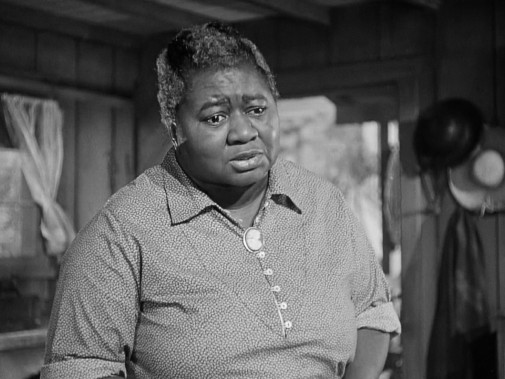
The Criterion Channel is currently featuring an extensive collection of John Huston movies. Considering his directorial debut, The Maltese Falcon, was nominated for three Oscars, including Best Picture, it's fair to say that Huston's films have always been on the Academy's radar. Consequently many of his actors gained Oscar buzz though just as often they were egregiously snubbed. With that said, I'd like to focus on a performer that was already an Oscar winner before she starred in a Huston flick, a Black actress whose career was limited by institutional racism and confined to playing second fiddle to white stars, often in peripheral roles. Nevertheless, Hattie McDaniel always spun gold from straw, injecting complicated humanity, humor, and pathos into the tiniest of parts. Such is the case of In This Our Life…
Adapted from Ellen Glasgow's Pulitzer Prize-winning novel, In This Our Life intersects an incestuous melodrama of southern decadence with a realistic depiction of racial injustice. In Virginia, the Timberlake clan prepares for the wedding of Stanley, their free-spirited daughter who is, in all things, a perfect counterpoint to her saintly sister, Roy. The night before the happy day, Stanley runs away with her sibling's spouse, Peter, leaving behind a haze of scandal and broken hearts. Soon, love blossoms between Roy and Craig, Stanley's jilted fiancé, while the other couple suffers through the souring of their relationship. Eventually, Peter kills himself, and, in sullen despair, Stanley comes back home in search of a new life with Craig, the wealth of her family's Fitzroy relatives, and social rehabilitation. Unfortunately, when that ploy goes wrong, she gets drunk and kills a child while driving under the influence.
Bette Davis and Olivia de Havilland are the stars, and they fully commit to the parts of Stanley and Roy, respectively. Exploring extremes of mercuriality and stoicism, they are astonishing, though some of the picture's richest material happens in the background of their feud. Between Davis' venom-spitting spectacle, a demon unleashed, and de Havilland's glamorous melodrama, a story of racial inequality is quietly bubbling at the heart of In This Our Life. After her crime, Stanley tries to blame a young Black man, Parry Clay, played by Ernest Anderson. He is the son of the Timberlake's maid, Minerva, and, despite the matriarch's testimony providing him an alibi, the police gives more value to the accusations of the rich white woman.
In This Our Life is keen on highlighting the Black labor sustaining the White people's comfort, positioning Stanley's crime as a continuation of her society's structural sins. Even if Huston had no such intentions, those ideas burst forth from the picture's imagery. Furthermore, Minerva and Parry gradually emerge as the narrative's most moral characters, whose noble suffering isn't so flat as to make them symbols rather than people. Part of the trick is the naked grotesquerie that director and star draw out of Stanley, making her into a monster whose sheer amorality illuminates her victims' humanity. More importantly, though, Emerson and Hattie McDaniel make the Clays into memorable figures, elevating the text, finding complexity in limited roles. While the Oscar-winning actress has minimal screen time and only about three scenes, she leaves a lasting impression.
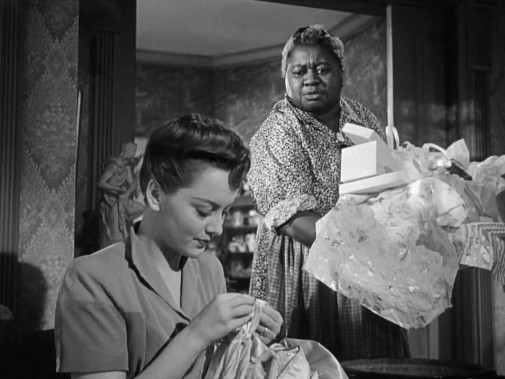
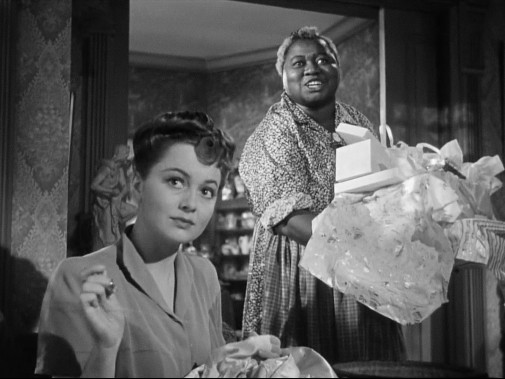
Firstly, McDaniel's always a marvel of comedic timing – see Alice Adams if you have any doubt – and she shows that off in her character's introduction. It's a needed effort for future tonal contrasts, setting the groundwork for a performance that'll soon tip into full-on tragedy. As Minerva cleans the mess of her bosses' house, fretting around the serene Roy, McDaniel trades jovial pleasantries with de Havilland. At first, one senses a glimmer of pity in the older woman's words, an attempt at cheering up the young lady who devotedly resews her old wedding gown to fit her cruel sister. While, at this point, no one but the adulterous lovers knows of Stanley's betrayal, there's bad blood between the two Timberlake heiresses, and it doesn't take a genius to see the shadow of displeasure in Roy's countenance. Minerva knows this. She knows these girls inside and out and likes Roy best. Even then, there are limits to her sweetness.
After Minerva compliments the Timberlake character, comparing de Havilland's Roy to a long-gone grandmother, the younger woman quickly responds with a self-deprecating comment. She may be like her ancestor in attitude, but she's not nearly as pretty. One would expect an abating response from the Black maid, a continuation of her beatific charade. However, Koch's screenplay ends the scene with a terse "no," which McDaniel delivers with hilarious dryness. It's simple and matter of fact, a casual dismissal that perfectly encapsulates how the entire household sees the sisters. There's no meanness in McDaniel's line reading, a mere affirmation of apparent truths that both sounds like admonishment and self-amusement. Minerva finds the Timberlakes complexes funny while still sympathizing with some of them, even drawing merriment from their soap opera antics and martyred weeps.
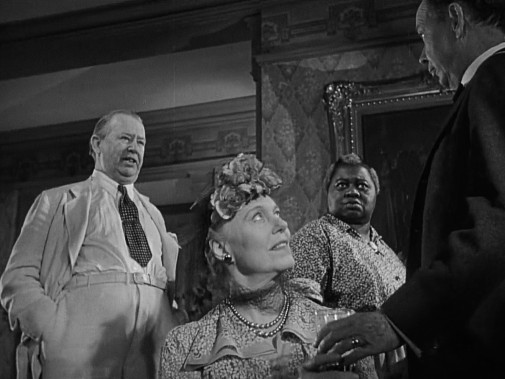
Maybe that's not what the written character is meant to be. However, a screenwriter's intention only goes so far until the performer takes the words and makes them their own. Unencumbered by the stereotypical dialect most productions forced on their Black actors, McDaniel uncovers multifaceted moods in Minerva's comments, adding spiky energy to the background of these introductory scenes. Later on, as the family congregates, the maid looks on, a worried frown twisting her visage into a stern dissonance. The genteel affectations of the White characters freeze them in inaction, sporting masks of tense apathy, worry sublimated in stiltedness. Only McDaniel's more demonstrative register delineates the incoming scandal, the unforgivable crime that's about to be committed between sisters. Looking at her, we know things will go wrong, even while the entire Timberlake and Fitzroy clan pretends there's nothing to worry about.
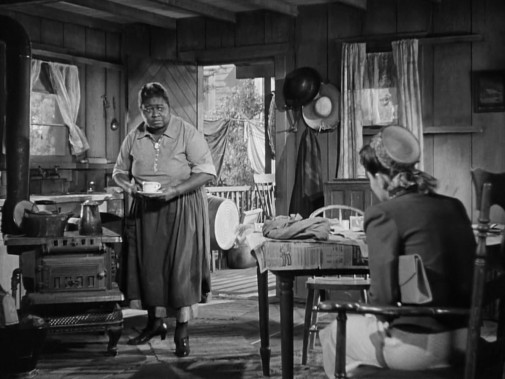
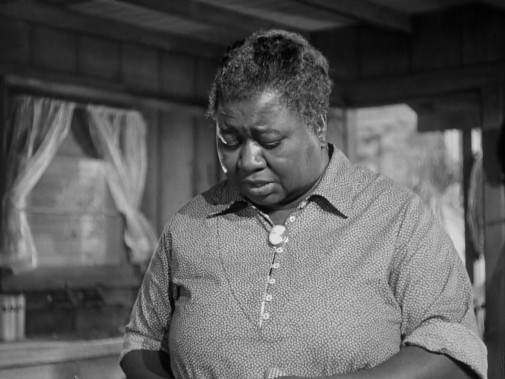
Her final scene arrives after this single mother's studious son has been arrested under false charges. In between, we've heard references to Minerva's pride in Parry's academic achievements but also her fears that a Black boy with high ambitions is bound to be hurt. As it turns out, she was right to be afraid. All that information weights on the film as Roy visits a heartbroken Minerva who insists that Parry's innocent, pleading to his accuser's sister with equal amounts of conviction and despondency. Watching this two-minute scene, it's difficult not to recall the stairway conversation between Melanie and Mammie in Gone with the Wind, though the framing is very different here. Apart from some reaction shots focused on de Havilland, this moment is unequivocally centered around McDaniel's Minerva, a tour-de-force of motherly pain that cuts through the melodrama at a crucial junction.
Aware that these dramatic showcases were a precious rarity in 1940s Hollywood, McDaniel digs into the diversity of sentimental shades she can bring to Minerva. However, she doesn't chew the scenery, surprising for how subdued her pain registers on camera. Minerva is a defeated woman, a maid whose subservience is always demanded, so much so that she starts the scene by serving Roy a cup of tea and never sits in her presence. Minerva's words are measured and laced with sorrow. Her eyes are unwaveringly fixated on de Havilland until she has to explain why the police didn't care about Parry's defenses. That moment is punctuated by an averted gaze, a downwards glance, almost as if Minerva is trying to hide her genuine emotion from Roy. Maybe it's shame or perchance anger. One thing's for sure – as the white woman leaves and the camera lingers on McDaniel, we're made aware of how hopeless this mother truly feels. She has no illusions of justice, and her exhausted farewell comes off as a half-swallowed whisper. It's devastating work, evocative of ugly realities most Hollywood productions from this period were unwilling to explore.
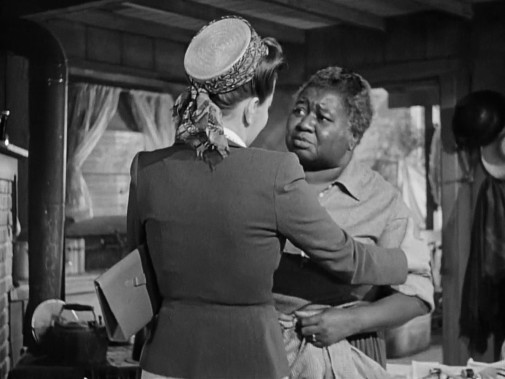
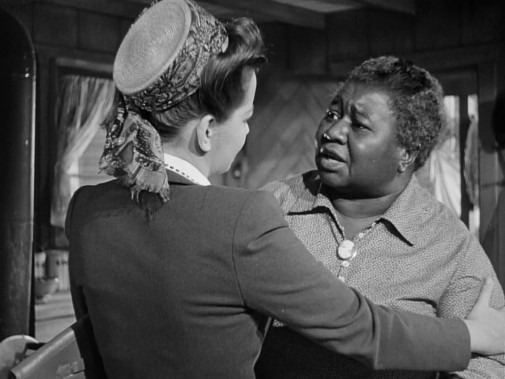
Considering the systemic issues working against Hattie McDaniel, including the smallness of her parts, one might suppose that she was never even close to getting a second nomination after her 1939 victory. In terms of screen time, it's important to note that AMPAS has regularly honored small performances in the Supporting Actress category. Of course, fraud is always an issue, but one or two-scene wonders have been celebrated since the category's inception in 1936. Just ask Maria Ouspenskaya. Furthermore, the actress received good notices for this tiny titanic performance, and the film's depiction of race issues was exulted. Even Bosley Crowther's tepid review complimented this aspect of In This Our Life. Because of the film's portrayal of African-Americans and their struggles, Warner Bros. was named to the Honor Roll of Race Relations in 1942. In retrospect, that makes the studio look good, especially since it underlines how ahead of its time the picture feels.
Financially, though, that would prove to be a liability, seeing as the Office of Censorship initially deemed the movie inappropriate for export. In any case, because of this uncommon social realism and the press that it inspired, the Black cast members got noticed in spite of the smallness of their roles. Both McDaniel and Anderson were honored by the National Board of Review, which is more than can be said for many of that year's Oscar nominees. Indeed, even in this time of few precursors, it's good to note that McDaniel gained more awards traction than some of the eventual contenders in Best Supporting Actress. The Academy's preferred five were Gladys Cooper in Now, Voyager, Agnes Moorehead in The Magnificent Ambersons, Susan Peters in Random Harvest, and both May Whitty and Teresa Wright in Mrs. Miniver. This last one would go on to win. She was also in the run for Best Actress thanks to The Pride of the Yankees but lost that prize to Mrs. Miniver herself, Greer Garson.
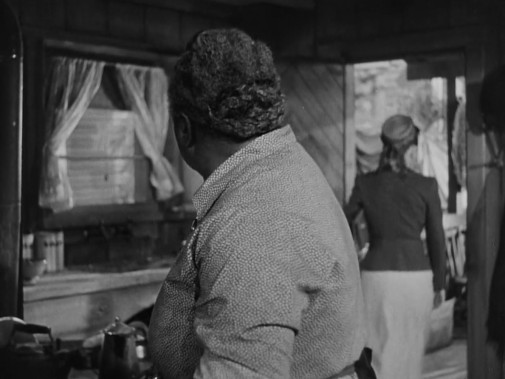
In This Our Life is streaming on the Criterion Channel.